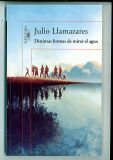New Spanish Books: The online guide of titles from Spanish publishers and literary agents with rights for translation in the UK. To consult titles available in other markets please click on the above links.
Distintas formas de mirar el agua

In a beautiful, desolate place, the death of a grandfather brings together all the members of a family. Beside the reservoir that swamped their home almost fifty years before, and where Domingo's ashes will lie for eternity, each member of the family silently reflects on their relationship with him and the others, and on how exile marked all their lives. This novel is an ensemble narrative of lives in which the clock cannot be turned back, a kaleidoscopic, dramatic narrative in which the surface of the reservoir serves as a mirror. There is no single way of looking at water, but the sense of uprooting, of definitive exile, has, drop by drop, generation after generation, permeated this family. Perhaps because no place is more painful than the one you will never be able to return to except in memory or death. But what's important is to return, like Ulysses to Ithaca. It doesn't matter how or in what form.
The novel tells the history of a family through the voices of its various members.
Virginia and Domingo had always lived and worked as farmers in the same remote village in the northeast of the province of León, a very beautiful, mountainous part of Spain. Then, when they were in their forties, by which time they had four children, they were told that the local river was to be dammed to make a reservoir and that their village and others in the area would be submerged. They were given some financial compensation and moved to an area that had once, ironically enough, been a lake, but was now a flat, featureless plain. Initially, they were put up in temporary accommodation until proper houses were built. They continued to farm, adapting to the different and more difficult circumstances, but Domingo always longed for the old life, for the old familiar landscape, although he always refused to go back to see the reservoir. In the end, with their children scattered and as they themselves became increasingly frail, Virginia and Domingo moved into an old people’s home, where Domingo quickly succumbed to dementia. To his devout wife’s consternation, he had always insisted that his body be cremated and for his ashes to be scattered on the waters of the reservoir where his village had once stood. That moment has now arrived, and nearly all the members of his family have travelled from their various parts of Spain to be there for the scattering of the ashes. In each chapter, we hear the thoughts of each of the family members present.
In his earlier novel, La lluvia amarilla (The Yellow Rain), Llamazares described the death of a village, as its inhabitants gradually left, family by family. He himself was born in one of the villages that were submerged by the reservoir described in the novel, and he writes with great knowledge and sensitivity about the fate of the inhabitants of those lost villages, about the diaspora of children and grandchildren, who have become separated not just from their parents and grandparents and from a particular landscape, but from an entire way of life. I found the book very moving and very true, and although the fate of villages in Britain has been slightly different, I feel sure that a British readership could relate to the lives described here, especially to the changes of attitude down the generations as families move away from a particular place and a particular way of life. Llamazares writes in a beautifully simple Spanish that would, I think, translate well into English.
From the reader´s report byMargaret Jull Costa
